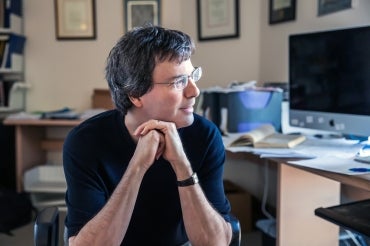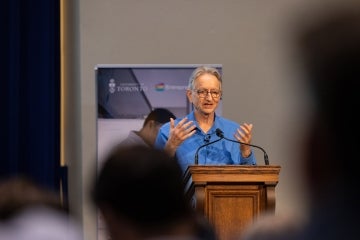U of T’s Lewis E. Kay named Canada Gairdner International Award Laureate

Published: March 28, 2017
University of Toronto Professor Lewis E. Kay has been named a 2017 Canada Gairdner International Award laureate. The Gairdner Awards – Canada’s highest prize for medical science – are often a forerunner to the Nobel Prize.
He is recognized for his role in developing modern nuclear magnetic resonance (NMR) spectroscopy which is used to study the structure and dynamics of large molecules like proteins. His findings have applications for molecular machines and rare protein conformations.
Kay’s methods allow researchers to see how the shapes of molecules change over time, a process that allows molecules to function. The result is new insight into the flexible nature of protein structure and how important that flexibility is to function and malfunction. Findings from the Kay lab could pave the way for drug targeting.
Kay holds the title of University Professor – the highest faculty rank U of T bestows – and is appointed to the departments of chemistry, biochemistry and molecular genetics. He is also a Senior Scientist at The Hospital for Sick Children (SickKids). His open source approach to research has allowed hundreds of scientists in academia and industry to use NMR methods developed by the Kay team.
“I am honoured by this recognition and am proud to be doing work that advances knowledge of how proteins change shape to affect our health while also setting the stage for further investigation,” says Kay.
Kay is one of two Canadians among the seven researchers recognized by the Gairdner Awards this year. He is one of five researchers being honoured this year with a Canada Gairdner International Award, which is given to biomedical scientists who have made original contributions to medicine, increasing understanding of human biology and disease.
Read the Globe and Mail article
See the CTV story
Earlier this year, Kay was named Officer of the Order of Canada. Over the course of his career, he has been honoured with several awards including the Merck Frosst Award, the Steacie Prize from the National Research Council of Canada, the Flavelle Medal from the Royal Society of Canada, the Founders Medal from the International Society of Magnetic Resonance in Biological Systems and the Gunther Laukien Prize. Kay is also a member of the Royal Society of Canada and the Royal Society (London). In 2005, Kay was listed in the Institute of Scientific Information’s database of Highly Cited Researchers.
“On behalf of the University of Toronto, I am proud to extend congratulations to Professor Kay for this well-deserved recognition by the Gairdner Foundation,” says Professor Vivek Goel, vice-president, research and innovation. “Not only are Professor Kay’s findings providing new insight into key regions within molecules for possible drug targets, his research could have implications for a variety of diseases like cancer, ALS, diabetes and cardiovascular disease.”
To date, more than 325 researchers have been recognized with a Canada Gairdner International Award. More than a quarter of those award recipients have later won the Nobel Prize in Medicine.
“Dr. Kay’s groundbreaking discoveries in molecular biochemistry and medical imaging science have advanced our knowledge of protein structure and function, giving us a deeper understanding of diseases and potential therapies,” says Dr. Michael Apkon, president and CEO of SickKids. “On behalf of the entire SickKids community, I congratulate Dr. Kay for being recognized as a leader in medical science with this prestigious award.”
The announcement was made this morning at the Toronto Reference Library.
Each year, the Gairdner Foundation honours biomedical researchers in three categories for their contributions to medicine. In addition to five international awards, one award is given to a scientist who has demonstrated outstanding national leadership in medicine and medical science in Canada. And a global health award goes to a scientist whose advances have (or potentially will have) a significant impact on health outcomes in the developing world. Each award is for $100,000.
This year’s awardees will be celebrated at an annual black-tie gala at the Royal Ontario Museum in October.



